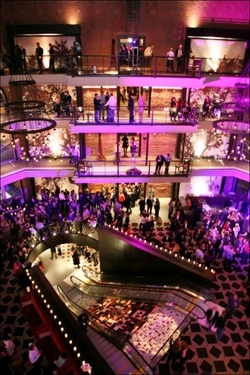 By Kellogg student Sean O'Grady
By Kellogg student Sean O'Grady - April 22, 2014
Under the supervision of Professor Therese McGuire, a group of students from Northwestern University's Kellogg School of Management spent the 2014 winter quarter examining the potential of repurposing Chicago Union Station’s headhouse as a way to revitalize the surrounding area. The students—Evan Dadosky, Leonardo Fernandes, Matthew Klein, Kristopher Lowes, Jennifer Nichols, and Sean O’Grady—presented their findings and recommendations before staff and members of the Metropolitan Planning Council and World Business Chicago on Wednesday, March 12, 2014. Another student, Aaron Toppston, participated fully in the lab class during the first half of the quarter.
Professor McGuire’s lab students recommend converting the vacant office space above Union Station’s headhouse into a hotel
Union Station consists of two separate and distinct structures, the underground concourse, where passengers board and disembark from trains, and the historic headhouse, consisting of the iconic Great Hall and eight stories of office space once occupied by the railroad companies who owned Union Station. Amtrak currently occupies 50,000 of the roughly 500,000 rentable square feet in the headhouse. Amtrak generates some revenue from the headhouse today by renting out the Great Hall for various functions, but otherwise the building is largely underutilized, especially given its prime location in Chicago’s West Loop. During the course of the lab, the students aimed to provide a proposal to redevelop the headhouse with the dual goals of enhancing the economic impact of Union Station on the surrounding neighborhood and providing incentives for Amtrak, the station’s owner, to pursue the project.
In order to understand how best to repurpose the headhouse, the students analyzed four potential property types: (1) office, (2) retail, (3) multifamily and (4) hotel. After evaluating existing and proposed construction in each of these different asset types, together with evaluating the current vacancy rates, market rates and associated trends, the team determined that a hotel would likely constitute the best use of the headhouse. While the supply of hotel rooms is expected to increase in the overall Chicago market, the students noted that the West Loop comprises a miniscule share of the hotel rooms in Chicago’s Central Business District, and there is no upscale hotel brand currently operating in the West Loop submarket. This presents an opportunity for a redeveloped headhouse to attract both business and tourist travelers who previously might have avoided the West Loop due to its lack of suitable hotel choices.

In Boston, a former jail was transformed into the Liberty Hotel.
The students also determined that the redevelopment of the headhouse as a hotel would allow for incorporation of the historical significance of the property, an important consideration for branding efforts. After evaluating branding efforts at locations such as the Liberty Hotel in Boston and Union Station in Nashville, among others, it became clear to the team that incorporating historical elements, while at the same time redeveloping the headhouse to revitalize and draw people to the West Loop neighborhood, could strongly impact economic development in the community.
In order to assess the financial feasibility of the project, the team consulted industry experts to determine reasonable assumptions for construction costs and pro forma cash flows. In addition, the students also studied similar public-private-partnership transactions to determine the appropriate structure of a potential deal. The team determined that the redevelopment would likely need to be done through a lease structure with a developer, rather than an outright sale. Ultimately the team’s financial analysis supported their conclusion that a hotel would provide the most value in the current market.
The Kellogg team would like to thank MarySue Barrett and Chrissy Mancini Nichols of MPC for providing information, insights and encouragement throughout the project. In addition, the team would like to thank Jasin Alfaro of AJ Capital, Dave Cocagne of Vermilion Development, Samir Mayekar of SiNode Systems, and Elizabeth Ziegler of the Kellogg School of Management for sharing their experiences and expertise as guest audience members during a dry-run presentation.